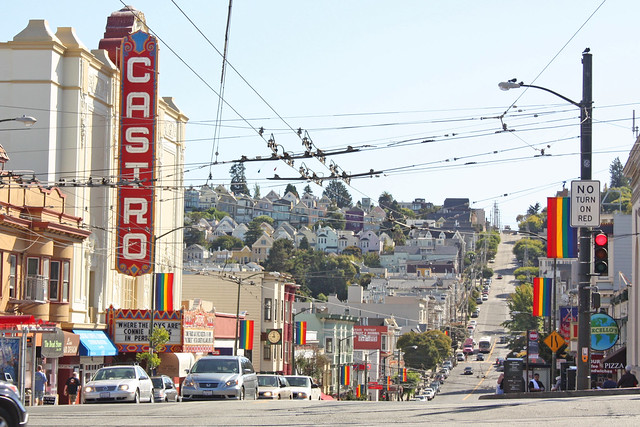Milk and his older brother Robert
Born in 1930 in New York, Milk was the younger of two children in his Lithuanian-American family. Both his parents were born in Lithuania and of Jewish decent. His father served in the Navy in WWII and his grandparents owned a department store. Milk went to college at the New York State College for Teachers in Albany where he majored in mathematics. He joined the Navy during the Korean War and served on a submarine rescue ship called the USS Kittiwake as a diving officer. He was discharged in 1955 after being questioned about his sexuality at. From there, Milk went to teach at a high school in Long Island, then as a stock analyst in New York City and finally as a production associate for Broadway musicals before moving to California in late 1972.
Milk's Camera shop
Milk opened a camera store on Castro street, the center of San Francisco's growing gay community. As a port city, San Francisco had a large gay population as the Navy discharged anyone who they deemed were homosexual. Milk gained popularity in the growing community, and a little after a year of living in the city, he decided to run for the board of City Supervisors. He lost, but it was only the beginning of his political career.
Castro Street, San Francisco
In 1975, Milk ran for a seat on the Board of City Supervisors again, this time only narrowly losing. However, Mayor George Moscone, a close friend, would appoint him to the city's board of permit appeals, making Milk the first openly gay city commissioner in the entirety of the US.Finally in the 1977 bid for a spot on the Board, Milk won, making national headlines and a huge victory in the gay community. As a supervisor, Milk lobbied for many important bills; including anti-discrimination bills to protect the LGBT community, converting ex-military buildings into low cost housing, day care for working mothers, and a reform for the tax code in the districts.
Milk was also an incredibly influential opponent to the Proposition 6 bill in California that would have made firing gay teachers legal. He rallied support from all around the state, visiting schools and counties all around, both friendly and unfriendly. He succeeded, and the bill was shot down, a huge victory at the time when there were bills being passed all around the coutry against the LGBT community.
Milk's and Moscones's vigil
White, Milk's assassin, was aquitted of his murder charges on the infamous "Twinkie Defense" and was sentenced to less than eight years in prison.Sources:
https://en.wikipedia.org/wiki/Harvey_Milk
http://milkfoundation.org/about/harvey-milk-biography/
http://www.biography.com/people/harvey-milk-9408170



It would be interesting to see exactly how the demographics that voted for Milk were formed. You mentioned that the city had a large gay population due to the release of gay navy officers from the port they had there; do you think that the change of opinion in Milk's favor came from demographic changes resulting from increased numbers of gays from the navy and elsewhere, or from legitimate changes of opinions from constituents?
ReplyDelete